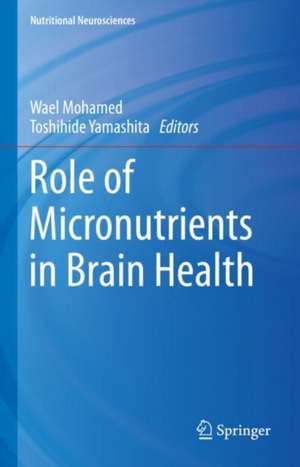Role of Micronutrients in Brain Health: Nutritional Neurosciences
Editat de Wael Mohamed, Toshihide Yamashitaen Limba Engleză Hardback – 30 mar 2022
| Toate formatele și edițiile | Preț | Express |
|---|---|---|
| Paperback (1) | 1218.21 lei 6-8 săpt. | |
| Springer Nature Singapore – 31 mar 2023 | 1218.21 lei 6-8 săpt. | |
| Hardback (1) | 1224.36 lei 6-8 săpt. | |
| Springer Nature Singapore – 30 mar 2022 | 1224.36 lei 6-8 săpt. |
Preț: 1224.36 lei
Preț vechi: 1493.13 lei
-18% Nou
Puncte Express: 1837
Preț estimativ în valută:
234.31€ • 244.31$ • 194.73£
234.31€ • 244.31$ • 194.73£
Carte tipărită la comandă
Livrare economică 20 martie-03 aprilie
Preluare comenzi: 021 569.72.76
Specificații
ISBN-13: 9789811664663
ISBN-10: 9811664668
Pagini: 308
Ilustrații: XVII, 308 p. 1 illus.
Dimensiuni: 155 x 235 mm
Greutate: 0.64 kg
Ediția:1st ed. 2022
Editura: Springer Nature Singapore
Colecția Springer
Seria Nutritional Neurosciences
Locul publicării:Singapore, Singapore
ISBN-10: 9811664668
Pagini: 308
Ilustrații: XVII, 308 p. 1 illus.
Dimensiuni: 155 x 235 mm
Greutate: 0.64 kg
Ediția:1st ed. 2022
Editura: Springer Nature Singapore
Colecția Springer
Seria Nutritional Neurosciences
Locul publicării:Singapore, Singapore
Cuprins
Chapter 1. Micronutrients and Neurogenesis.- Chapter 2. Vit-E and Cognitive functions: What is the Interplay?.- Chapter 3. Microbiome and micronutrients.- Chapter 4. Iodine and Brain.- Chapter 5. Tocotrienol and Brain.- Chapter 6. Micronutrients and Depression.- Chapter 7. Micronutrients and Epilepsy.- Chapter 8. Iron Deficiency and brain cognitive functions.- Chapter 9. Micronutrients and PD.- Chapter 10. Malnutrition of Micronutrients and the brain disorders.- Chapter 11. Connections between micronutrients, cerebral monoamines and related brain disorders.- Chapter 12. Micronutrients and Autism.- Chapter 13. Edible Bird’s Nest as Brain Food.- Chapter 14. Phytochemicals as Micronutrients: What is Their Therapeutic Promise in the Management of Traumatic Brain Injury?.- Chapter 15. Phytochemicals as Micronutrients: What is Their Therapeutic Promise in the Management of Alzheimer’s Disease?.- Chapter 16. Nutrigenomics and Brain.
Notă biografică
Dr. Mohamed is a clinical pharmacologist, neuroscientist, and psychiatrist. Dr. Mohamed got his PhD from PSU, USA, and is currently working as an assistant professor in IIUM Medical School, Malaysia. Dr. Mohamed has been invited to deliver more than 120 lectures locally and abroad. He has published over 60 peer-reviewed papers related to neuroscience/psychiatry with an h-index of 16. Moreover, he is an editor in Frontiers in Neurology and PLOS-ONE journal, and has edited many journal special issues on brain disorders. Additionally, he is editing a few books in the field of neuroscience with Springer and Cambridge. He has received many research grants from national and international organizations, namely IBRO, ISN, MJF, STDF, FRGS, and INDO-ASEAN, with a total research funding of half a million US dollars. He is now an active partner in GP2 consortium (IPDG-Asia).
Toshihide Yamashita is the Osaka University Distinguished Professor and the head of the Department of Molecular Neuroscience and the Department of Neuro-Medical Science, Graduate School of Medicine, Osaka University. He graduated from Osaka University Medical School in 1990 and had clinical training as a neurosurgeon. His research has focused on restoration and regeneration of the injured or degenerated central nervous system (CNS). In 2005, he received Ameritec Prize (USA), which was awarded in recognition of a specific, significant accomplishment in medical research toward functional recovery from spinal cord injury. The Japan Society for the Promotion of Sciences (JSPS) Prize (2011), Osaka Science Prize (2012), and Commendation for Science and Technology by the Minister of Education, Culture, Sports, Science and Technology (2014) were awarded to him for his discovery of molecular mechanisms regulating the regeneration and plasticity of injured CNS. He has published more than two hundred international original research papers. He is now developing humanized antibody that targets one of the axon growth inhibitors in collaboration with Mitsubishi Tanabe Pharma, and is carrying out the clinical trial for spinal cord injury.
Toshihide Yamashita is the Osaka University Distinguished Professor and the head of the Department of Molecular Neuroscience and the Department of Neuro-Medical Science, Graduate School of Medicine, Osaka University. He graduated from Osaka University Medical School in 1990 and had clinical training as a neurosurgeon. His research has focused on restoration and regeneration of the injured or degenerated central nervous system (CNS). In 2005, he received Ameritec Prize (USA), which was awarded in recognition of a specific, significant accomplishment in medical research toward functional recovery from spinal cord injury. The Japan Society for the Promotion of Sciences (JSPS) Prize (2011), Osaka Science Prize (2012), and Commendation for Science and Technology by the Minister of Education, Culture, Sports, Science and Technology (2014) were awarded to him for his discovery of molecular mechanisms regulating the regeneration and plasticity of injured CNS. He has published more than two hundred international original research papers. He is now developing humanized antibody that targets one of the axon growth inhibitors in collaboration with Mitsubishi Tanabe Pharma, and is carrying out the clinical trial for spinal cord injury.
Textul de pe ultima copertă
This book comprehensively reviews the relationship between micronutrients and brain in health and diseases. It explains the relationship between micronutrients and brain functions, neurogenesis, and cognitive functions. The book also explores the relationship between micronutrients and brain disorders including depression, epilepsy, PD, and Autism. It further explores the recent advancements in understanding the important role of micronutrients as therapeutics in various brain disorders like TBI and AD. Lastly, it presents an overview of micronutrients as neuroprotective agents along with the main principles of nutrigenomics.
Caracteristici
Discusses the role of micronutrients on brain health and function Examines nutrition-epigenetic interaction in neurodegenerative disorders Presents nutrition-epigenetic interaction in neurodegenerative disorders












